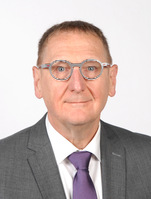报告题目:Redefining Chemical Production Leveraging Continuous Flow Synthesis and Advanced Technologies
报 告 人:Christophe LEN,PSL Research University(巴黎文理研究大学)、Chimie ParisTech(巴黎高科化学学院)教授
邀 请 人:李映伟 教授
报告时间:2025年1月23日(星期四)上午10:00—12:00
报告地点:化学与化工学院逸夫工程馆105会议室
主办单位:化学与化工学院
报告人简介:

Prof. Dr. Christophe Len received his Ph.D. in 1995 from the Université de Picardie Jules Verne followed by a post-doctoral fellow at the University of Hull (UK). In 1997, he became assistant Professor at UPJV and was promoted to full Professor in 2004 at the Université de Poitiers (France). In 2010, he moved as full Professor to the Université de Technologie de Compiègne - UTC (France). Since 2017, he has developed his research at Chimie ParisTech (France). He has published ~ 270 original publications and review articles, 11 book chapters, and 12 patents (H 51, 8035 citations, Scopus). Among recent awards and recognition to his scientific career, he was promoted Honorary Professor of the University of Hull, England (2012–2018), Honorary Professor at the University of Delhi, India (2022), Honorary Professor at the Xi’an Jiaotong University, China (2022-2025) and Fellow of the Royal Society of Chemistry (FRSC, 2015). In 2017, he was honored with the 2017 Glycerine Innovation Award sponsored by the American Cleaning Institute and the National Biodiesel Board. His current research explores organic chemistry and continuous flow.
报告摘要:
The principles of sustainable development, the bio-economy, and the circular economy are increasingly being applied to the synthesis of industrially relevant molecules. In this context, furfural and glycerol, which serve as platform molecules, are the subject of diverse research approaches aimed at improving their conversion into valuable compounds. Given the current momentum in promoting green chemistry for sustainable development, chemists have recently pioneered catalytic reactions utilizing innovative technologies, such as continuous flow processes.
This study highlights recent advancements in the continuous production of derivatives obtained from furfural and glycerol. Among the noteworthy molecules of interest are furfuryl alcohol, levulinic acid and its esters, gamma valerolactone, acrolein, quinoline-type derivatives, solketal, triacetin, and glycerol oligomers. These derivatives are synthesized from biomass or carbohydrates, utilizing both homogeneous and heterogeneous catalysts. Various reaction parameters, including temperature, catalyst and feedstock loadings, and solvent types, have been meticulously fine-tuned with a focus on time efficiency. The conceptualization, synthesis, and detailed examination of the physicochemical properties of these derivatives will be comprehensively addressed [1-6].
References
[1] S. Bruniaux, D. Luart, C. Len, Synthesis 50 1849 (2018)
[2] Y. Wang, P. Prinsen, K.S. Triantafyllidis, S.A. Karakoulia, A. Yepez, C. Len, R. Luque, ChemCatChem. 10 3459 (2018)
[3] D. Zhao, P. Prinsen, Y. Wang, W. Ouyang, F. Delbecq, C. Len, R. Luque, ACS Sustainable Chem. Eng. 6 6901 (2018)
[4] D. Zhao, Y. Wang, F. Delbecq, C. Len, Mol. Catal. 475 110456 (2019)
[5] R. Radjagobalou, V. Rouffeteau, A. Deleu, P. Nabokoff, J. Cossy, C. Len, Mol. Catal. 524 112321 (2022)
[6] Q. Si, D. Zhao, Z. Yang, T. Su, C. Len, J. Zhao, H. Zhang, Mat. Today Chem. 39 102181 (2024)
